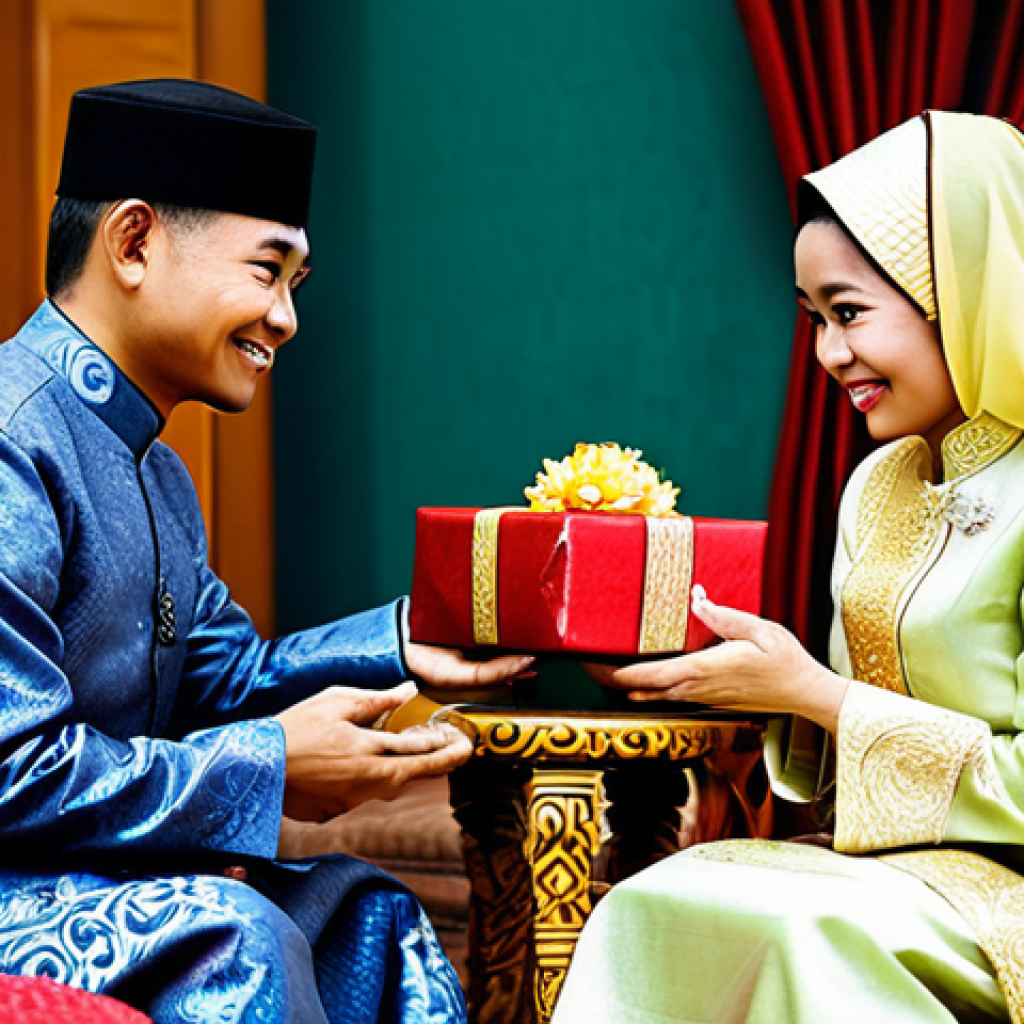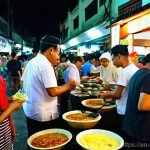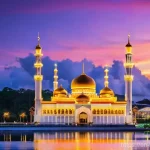Brunei, a land of gilded domes and lush rainforests, holds traditions as rich and vibrant as its landscape. One of the most fascinating aspects of Bruneian culture is its unique wedding customs, passed down through generations.
These aren’t your typical white dress and bouquet affairs; think more along the lines of elaborate ceremonies, shimmering fabrics, and deep-rooted symbolism that speaks of community, family, and the sacred union of two souls.
Having witnessed a Bruneian wedding myself – a riot of color and music that went on for days – I can attest to the sheer spectacle and cultural significance of these celebrations.
The air is thick with anticipation, not just for the happy couple, but for the preservation of these time-honored practices. With a growing global interest in unique cultural experiences and a renewed focus on preserving heritage, Bruneian weddings are gaining attention, offering a glimpse into a world where tradition thrives.
Moreover, with the rise of cultural tourism and personalized wedding experiences, more couples might seek inspiration from these unique celebrations in the future.
Let’s delve deeper into the fascinating world of Bruneian wedding traditions.
Brunei, a land of gilded domes and lush rainforests, holds traditions as rich and vibrant as its landscape. One of the most fascinating aspects of Bruneian culture is its unique wedding customs, passed down through generations.
These aren’t your typical white dress and bouquet affairs; think more along the lines of elaborate ceremonies, shimmering fabrics, and deep-rooted symbolism that speaks of community, family, and the sacred union of two souls.
Having witnessed a Bruneian wedding myself – a riot of color and music that went on for days – I can attest to the sheer spectacle and cultural significance of these celebrations.
The air is thick with anticipation, not just for the happy couple, but for the preservation of these time-honored practices. With a growing global interest in unique cultural experiences and a renewed focus on preserving heritage, Bruneian weddings are gaining attention, offering a glimpse into a world where tradition thrives.
Moreover, with the rise of cultural tourism and personalized wedding experiences, more couples might seek inspiration from these unique celebrations in the future.
Let’s delve deeper into the fascinating world of Bruneian wedding traditions.
The Majlis Istiadat Bersuruh Diri: A Formal Proposal
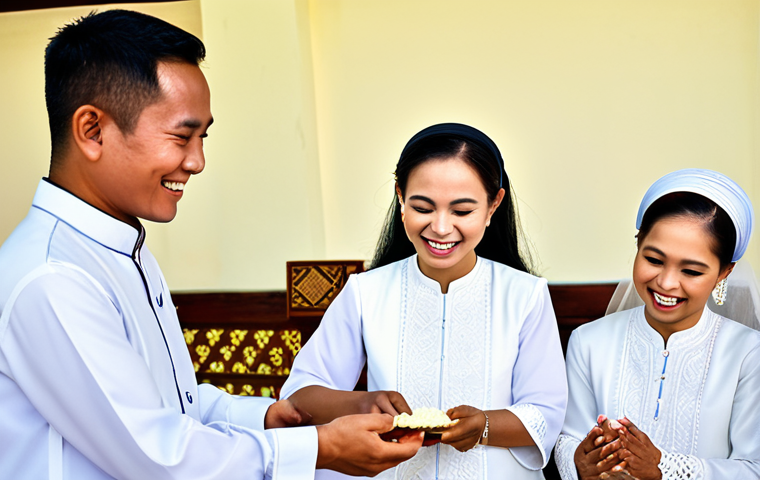
Before the grand festivities can begin, the Majlis Istiadat Bersuruh Diri, or the formal proposal ceremony, sets the stage. This is no casual affair; it’s a carefully orchestrated event steeped in protocol and respect.
Witnessing this ceremony felt like stepping back in time, a moment where tradition reigned supreme. The groom’s family, led by respected elders, formally requests the bride’s hand in marriage from her family.
Gifts are presented, and negotiations take place, all conducted with the utmost courtesy and decorum. I remember the air being thick with anticipation, every word and gesture carrying significant weight.
1. The Role of Family Elders
The elders of both families play a pivotal role in this ceremony. They are the keepers of tradition, guiding the proceedings and ensuring that all customs are followed correctly.
Their experience and wisdom are highly valued, and their approval is essential for the marriage to proceed. I saw firsthand how their presence commanded respect, their every utterance carrying significant weight.
It’s a beautiful reminder of the importance of family in Bruneian culture.
2. Gift-Giving and Negotiations
The exchange of gifts is a crucial part of the Majlis Istiadat Bersuruh Diri. These gifts, often consisting of traditional Bruneian crafts, fabrics, and food, symbolize the groom’s family’s respect and appreciation for the bride’s family.
Negotiations regarding the dowry (Berian) also take place during this ceremony, ensuring that both families are in agreement before the wedding preparations proceed.
From what I observed, it’s not just about the monetary value, but the symbolic gesture of uniting the families.
3. Setting the Date: Auspicious Timing
Choosing an auspicious date for the wedding is also a key part of the proposal. The date is often determined by religious officials or respected elders who consult the Islamic calendar to ensure that the wedding takes place on a day that is considered lucky and blessed.
This emphasizes the importance of religious beliefs and traditions in the decision-making process. I was told that choosing the right date can bring good fortune and happiness to the couple’s marriage.
Berbedak Mandi: The Ritual Cleansing and Beautification
The Berbedak Mandi is a traditional ritual involving the application of a special paste (Berbedak) to the bride and groom, symbolizing purification and blessings.
Having observed this ritual, I was struck by the intimate and communal nature of the event. It’s not just about physical cleansing; it’s a spiritual preparation for the marriage ahead.
The air is filled with fragrant herbs and the soft murmur of prayers, creating a serene and sacred atmosphere.
1. The Significance of the Berbedak Paste
The Berbedak paste is made from a mixture of fragrant herbs, spices, and rice flour, each ingredient carefully chosen for its symbolic properties. The paste is believed to cleanse the skin, ward off evil spirits, and bring good luck to the couple.
The application of the paste is a symbolic act of purification, preparing the bride and groom for their new life together. I even caught a whiff of sandalwood, known for its calming properties, which added to the tranquility of the ceremony.
2. Blessings and Prayers
During the Berbedak Mandi, family members and close friends take turns applying the paste to the bride and groom while offering blessings and prayers for their happiness and well-being.
This act of communal blessing strengthens the bonds between the couple and their families, reinforcing the importance of community support in Bruneian culture.
I noticed how each person’s touch was filled with warmth and genuine affection.
3. Traditional Music and Dance
The Berbedak Mandi is often accompanied by traditional Bruneian music and dance, adding to the festive atmosphere of the occasion. The music is usually performed by a live band, and the dances are graceful and symbolic, reflecting the rich cultural heritage of Brunei.
The rhythmic beats and elegant movements create a vibrant and unforgettable experience. The dancers’ costumes were especially captivating, shimmering with gold and intricate designs.
The Malam Berinai: Henna Night
Similar to henna nights in other cultures, the Malam Berinai is a joyous occasion where intricate henna designs are applied to the bride’s hands and feet.
This is a women-only event filled with laughter, music, and delicious food. Observing this vibrant night, I was struck by the sense of camaraderie and celebration.
It’s a time for the women in the bride’s life to come together and share stories, advice, and well wishes for her future.
1. The Art of Henna Application
The application of henna is a highly skilled art form, with intricate designs that can take hours to complete. The henna patterns are often symbolic, representing fertility, good luck, and protection from evil spirits.
The process is meticulous, requiring a steady hand and a keen eye for detail. The artistry involved is truly remarkable, transforming the bride’s hands and feet into living canvases.
2. Women’s Gathering and Celebrations
The Malam Berinai is a celebration of womanhood and a time for the women in the bride’s life to bond and offer their support. Stories are shared, advice is given, and traditional songs are sung, creating a warm and supportive atmosphere.
The event is filled with laughter, music, and dancing, making it a memorable experience for everyone involved. The energy in the room was palpable, a vibrant mix of joy and excitement.
3. Traditional Food and Treats
No Bruneian celebration is complete without delicious food, and the Malam Berinai is no exception. Traditional Bruneian dishes, such as Ambuyat (a sticky tapioca dish) and Nasi Katok (simple fried chicken and rice), are served, along with a variety of sweet treats and desserts.
The food is a symbol of abundance and good fortune, adding to the festive atmosphere of the occasion. I sampled some of the local delicacies, and the flavors were truly exquisite.
Nikah: The Solemnization of the Marriage
The Nikah is the most important part of the wedding ceremony, as it is the official solemnization of the marriage under Islamic law. This is a more formal and religious event, usually held in a mosque or a private residence.
Witnessing the Nikah was a deeply moving experience, a testament to the sanctity of marriage in Bruneian culture. The air is filled with reverence and respect as the bride and groom pledge their commitment to each other.
1. The Role of the Imam and Witnesses
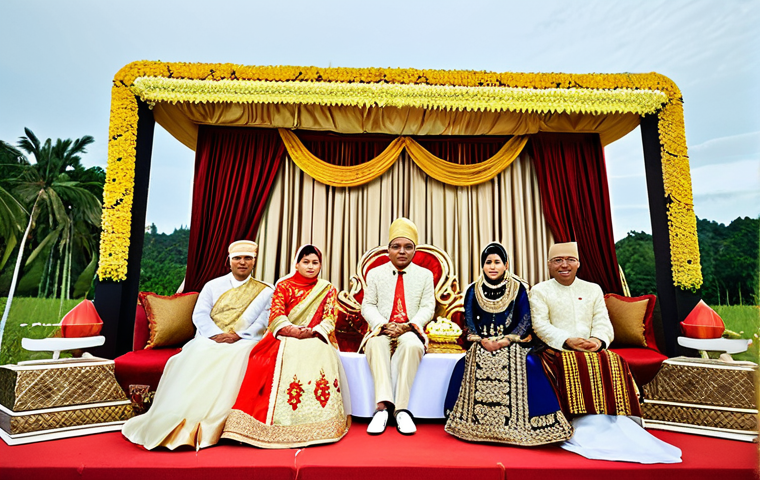
The Nikah is conducted by an Imam (religious leader) in the presence of witnesses, who ensure that the marriage is performed according to Islamic law.
The Imam recites verses from the Quran and explains the rights and responsibilities of both the bride and groom. The witnesses play a crucial role in verifying the legitimacy of the marriage.
Their presence adds a layer of accountability and ensures that the ceremony is conducted with integrity.
2. The Ijab and Qabul: The Marriage Contract
The Ijab and Qabul are the key components of the Nikah, representing the offer and acceptance of the marriage contract. The bride’s father or guardian offers her in marriage to the groom, and the groom accepts the offer in the presence of the Imam and witnesses.
This exchange signifies the mutual agreement and commitment of both parties to enter into the marriage. The words spoken during this exchange are powerful and binding, marking the official beginning of their life together.
3. Prayers and Blessings
Following the Ijab and Qabul, prayers are offered for the happiness and well-being of the newly married couple. Family members and friends extend their blessings, wishing them a long and prosperous life together.
The atmosphere is filled with hope and optimism for the future. These prayers and blessings serve as a reminder of the importance of faith and community support in Bruneian marriages.
The Resepsi: The Grand Reception
The Resepsi is the grand reception, a lavish celebration that marks the culmination of the wedding festivities. This is a time for the couple to celebrate their marriage with family, friends, and the wider community.
Having attended a Resepsi, I can attest to the sheer scale and extravagance of the event. The venue is usually decorated with elaborate floral arrangements, shimmering fabrics, and ornate decorations, creating a dazzling spectacle.
1. Elaborate Decorations and Attire
The decorations at the Resepsi are usually extravagant, reflecting the importance of the occasion. Floral arrangements, shimmering fabrics, and ornate decorations create a visually stunning atmosphere.
The bride and groom are dressed in their finest attire, often wearing traditional Bruneian wedding outfits that are adorned with gold and precious stones.
The attention to detail is remarkable, showcasing the couple’s commitment to tradition and elegance.
2. Feasting and Entertainment
The Resepsi is a feast for the senses, with a wide array of traditional Bruneian dishes and international cuisine served to the guests. Live music, dance performances, and other forms of entertainment add to the festive atmosphere.
The celebration can last for hours, with guests enjoying the food, music, and company of their loved ones. The energy is infectious, creating a joyous and unforgettable experience for everyone in attendance.
3. Gift-Giving and Well-Wishes
During the Resepsi, guests present gifts to the newly married couple, wishing them happiness and prosperity in their new life together. These gifts can range from traditional Bruneian crafts to modern household items.
The act of gift-giving symbolizes the community’s support for the couple and their commitment to helping them build a successful future. The expressions of love and support are heartwarming, reinforcing the importance of community in Bruneian culture.
Istiadat Menziarahi: Paying Respects to Elders
The Istiadat Menziarahi involves the newly married couple visiting the homes of their elders to pay their respects and seek blessings. This tradition highlights the importance of respecting elders and maintaining family ties in Bruneian culture.
Witnessing this practice was a humbling experience, a reminder of the deep-rooted values that underpin Bruneian society.
1. Seeking Blessings and Guidance
The purpose of the Istiadat Menziarahi is for the newly married couple to seek blessings and guidance from their elders. The elders offer advice on marriage, family, and life in general, sharing their wisdom and experience with the younger generation.
This exchange strengthens the bonds between generations and reinforces the importance of tradition. The respect and reverence shown by the couple is truly admirable.
2. Strengthening Family Bonds
The Istiadat Menziarahi is an opportunity for the newly married couple to strengthen their family bonds and demonstrate their commitment to their families.
By visiting their elders and seeking their blessings, they show their appreciation for their support and guidance. This practice helps to maintain family harmony and ensures that traditional values are passed down from one generation to the next.
The sense of unity and connection is palpable, highlighting the importance of family in Bruneian culture. Here’s a table summarizing key aspects of Bruneian wedding traditions:
| Tradition | Description | Significance |
|---|---|---|
| Majlis Istiadat Bersuruh Diri | Formal proposal ceremony with gift-giving and negotiations | Formal request for marriage, strengthening family ties |
| Berbedak Mandi | Ritual cleansing with fragrant paste, blessings, and prayers | Purification, warding off evil spirits, communal blessing |
| Malam Berinai | Henna night with intricate designs, women’s gathering, and celebration | Celebration of womanhood, bonding, good luck |
| Nikah | Solemnization of marriage under Islamic law | Official union, religious commitment |
| Resepsi | Grand reception with elaborate decorations, feasting, and entertainment | Celebration with family and community |
| Istiadat Menziarahi | Paying respects to elders and seeking blessings | Respect for elders, family ties, guidance |
Bruneian weddings, with their rich tapestry of traditions, offer a fascinating glimpse into a culture that deeply values family, community, and heritage.
Having journeyed through these customs, from the solemn proposal to the joyous reception, I am left with a profound appreciation for the beauty and significance of these celebrations.
As global interest in unique cultural experiences continues to grow, Bruneian wedding traditions stand as a testament to the enduring power of tradition in a rapidly changing world.
In Conclusion
Witnessing a Bruneian wedding is more than just attending a ceremony; it’s immersing yourself in a world where every ritual, every gesture, and every color tells a story. It’s a reminder of the importance of preserving cultural heritage and celebrating the bonds that unite us. As we embrace diversity and seek meaningful connections, perhaps we can all draw inspiration from the timeless traditions of Brunei.
Good to Know Information
1. Best Time to Attend: Brunei experiences a tropical climate, so the best time to attend a wedding is during the drier months, typically from March to September.
2. Dress Code Etiquette: When attending a Bruneian wedding, it’s important to dress modestly and respectfully. For women, long dresses or skirts are appropriate. Men should wear long-sleeved shirts and trousers. Avoid wearing overly revealing or casual attire.
3. Gift-Giving Customs: It is customary to give a gift to the newly married couple. Monetary gifts are common and are often presented in a decorated envelope. Alternatively, you can give household items or traditional Bruneian crafts.
4. Photography Considerations: Always ask for permission before taking photos of the bride, groom, or guests. Be respectful of the ceremony and avoid using flash photography during the more solemn moments.
5. Transportation Tips: Getting around Brunei is relatively easy. Taxis and ride-sharing services are available, but it’s best to arrange transportation in advance, especially if you’re attending a wedding in a more remote location.
Key Takeaways
Understanding the key elements of Bruneian wedding traditions is essential for appreciating the depth and significance of these celebrations. From the formal proposal to the grand reception, each ritual plays a crucial role in uniting families, celebrating community, and honoring cultural heritage. Embracing these traditions allows us to gain a deeper understanding of Bruneian culture and the values that underpin it.
Frequently Asked Questions (FAQ) 📖
Q: What makes Bruneian wedding traditions so unique compared to Western weddings?
A: Okay, so forget the simple white dress and a quick exchange of vows. Bruneian weddings, from what I’ve seen, are on a completely different level! Think vibrant, dazzling colors, incredibly intricate outfits dripping with gold, and ceremonies that can stretch on for days.
It’s not just a wedding; it’s a massive cultural celebration involving the whole community. The focus is heavily on tradition, family ties, and really showcasing the couple’s status and prosperity.
It’s like stepping into a real-life fairytale, but with a strong emphasis on preserving their heritage.
Q: I’m planning a destination wedding and I’m intrigued by Bruneian traditions.
A: re there any specific elements I could incorporate into my own wedding, even if I’m not Bruneian? A2: Absolutely! While the full Bruneian wedding experience is deeply rooted in their culture, you could definitely borrow some elements.
The emphasis on elaborate decorations and vibrant colors is a great starting point. Think about incorporating rich fabrics like silk or brocade, and don’t be afraid to go bold with your color palette.
Also, Bruneian weddings often involve multiple ceremonies, so you could perhaps extend your wedding celebrations over a couple of days, incorporating different themes or cultural elements.
Finally, consider the importance of community – involve your family and friends in the planning and execution to really capture that sense of togetherness so central to Bruneian weddings.
Just remember to be respectful and honor the traditions, rather than appropriating them.
Q: Given Brunei’s strong cultural emphasis on tradition, how are younger generations embracing or changing these wedding customs?
A: re they modernizing anything? A3: That’s a great question! From what I’ve gathered, it’s a delicate balance.
On one hand, there’s a strong desire to uphold the traditions that define Bruneian identity. Families put a lot of effort into ensuring that the younger generation understands and appreciates the significance of these customs.
However, with increased exposure to global trends and social media, there’s also a natural pull towards modernization. You might see younger couples incorporating modern technology, like drone photography or live streaming, into their weddings.
Some might also opt for slightly less extravagant outfits or shorten some of the ceremonial proceedings to fit modern lifestyles. But at the heart of it all, the core values of family, community, and respect for tradition still remain paramount.
It’s a fascinating blend of old and new!
📚 References
Wikipedia Encyclopedia
구글 검색 결과
구글 검색 결과
구글 검색 결과
구글 검색 결과
구글 검색 결과
